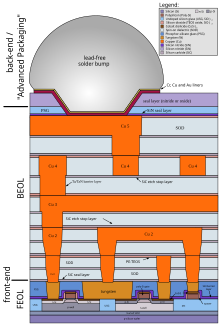Front end of line: Difference between revisions
Appearance
Content deleted Content added
add shortdesc |
No edit summary |
||
| Line 4: | Line 4: | ||
[[File:CMOS fabrication process.svg|thumb|CMOS fabrication process]] |
[[File:CMOS fabrication process.svg|thumb|CMOS fabrication process]] |
||
The '''front-end-of-line''' ('''FEOL''') is the first portion of [[Fabrication (semiconductor)|IC fabrication]] where the individual |
The '''front-end-of-line''' ('''FEOL''') is the first portion of [[Fabrication (semiconductor)|IC fabrication]] where the individual components ([[transistor]]s, [[capacitor]]s, [[resistor]]s, etc.) are patterned in the [[semiconductor]].<ref> |
||
{{cite book |
{{cite book |
||
| title = Handbook of Silicon Wafer Cleaning Technology |
| title = Handbook of Silicon Wafer Cleaning Technology |
||
Revision as of 10:32, 28 July 2022
This article needs additional citations for verification. (December 2009) |


The front-end-of-line (FEOL) is the first portion of IC fabrication where the individual components (transistors, capacitors, resistors, etc.) are patterned in the semiconductor.[1] FEOL generally covers everything up to (but not including) the deposition of metal interconnect layers.
For the CMOS process, FEOL contains all fabrication steps needed to form fully isolated CMOS elements:
- Selecting the type of wafer to be used; Chemical-mechanical planarization and cleaning of the wafer.
- Shallow trench isolation (STI) (or LOCOS in early processes, with feature size > 0.25 μm)
- Well formation
- Gate module formation
- Source and drain module formation
See also
References
- ^ Karen A. Reinhardt and Werner Kern (2008). Handbook of Silicon Wafer Cleaning Technology (2nd ed.). William Andrew. p. 202. ISBN 978-0-8155-1554-8.
Further reading
- "CMOS: Circuit Design, Layout, and Simulation" Wiley-IEEE, 2010. ISBN 978-0-470-88132-3. pages 177-178 (Chapter 7.2 CMOS Process Integration); pages 180-199 (7.2.1 Frontend-of-the-line integration)
